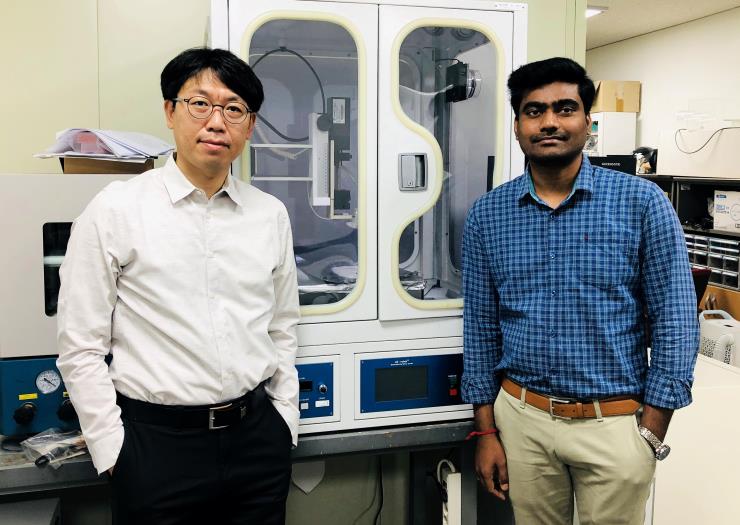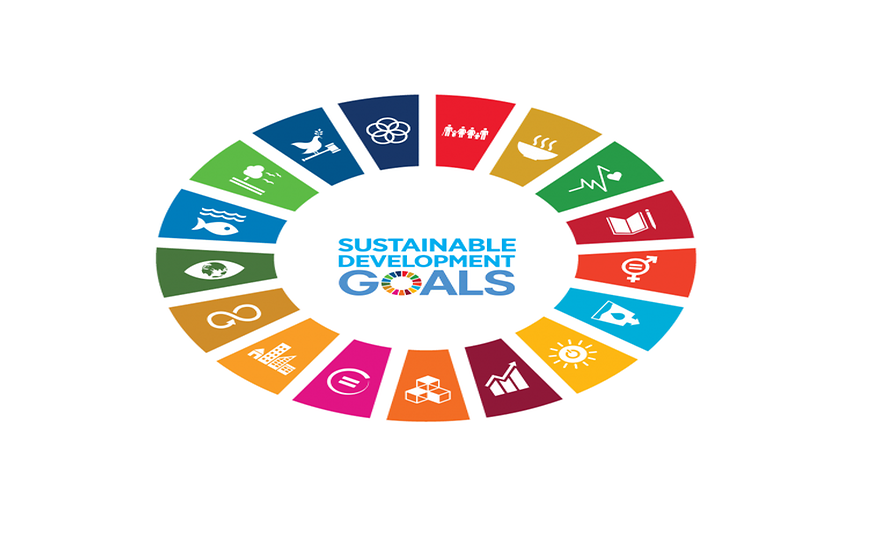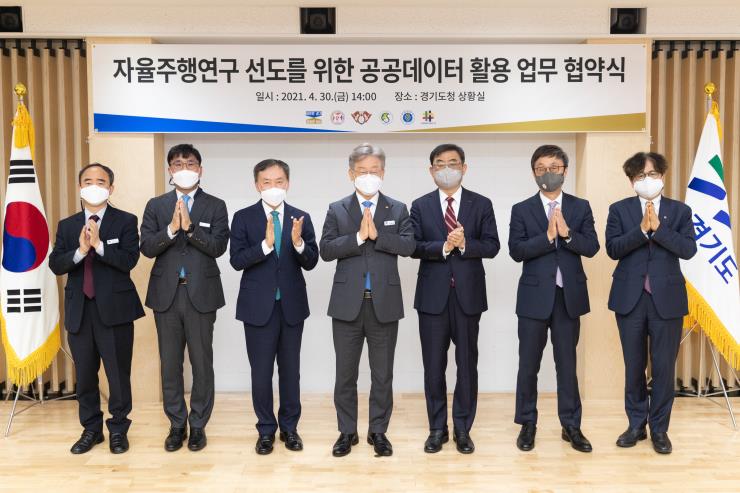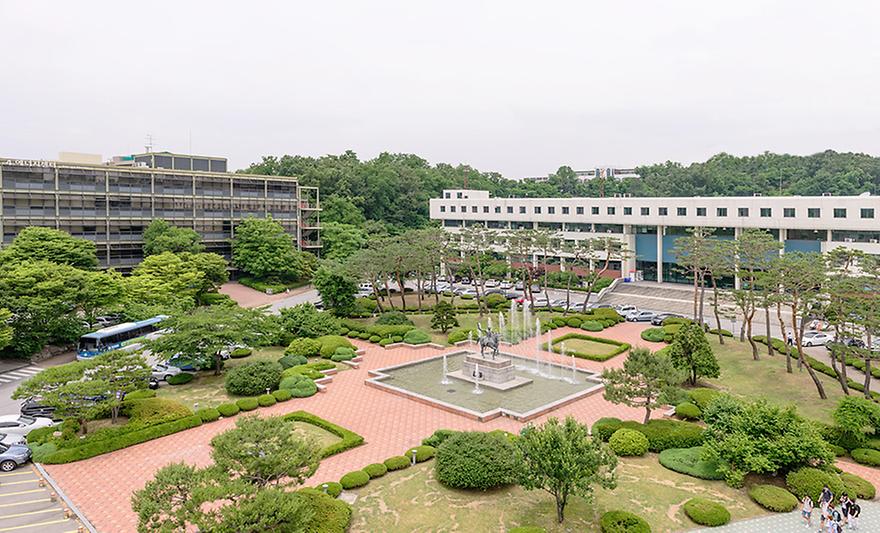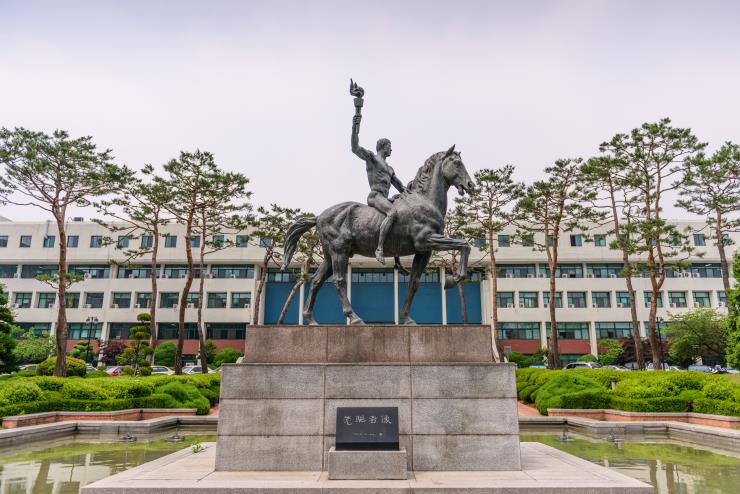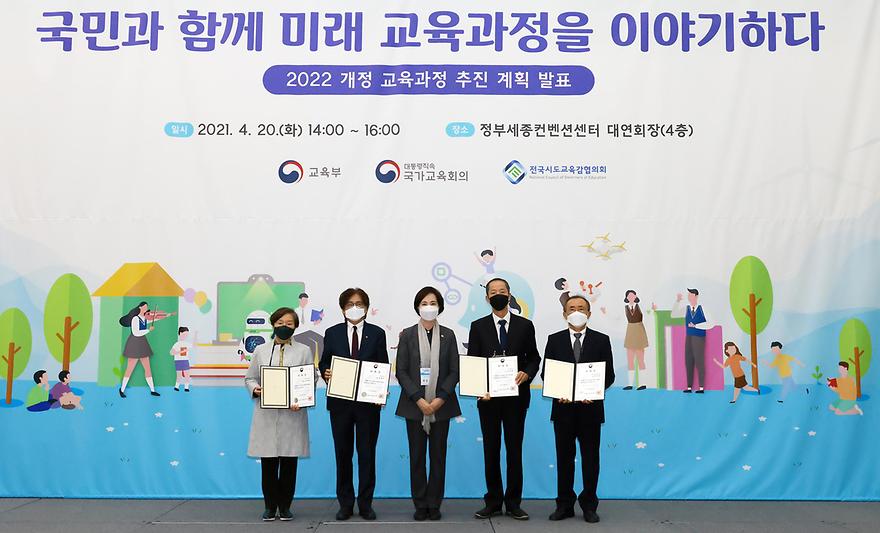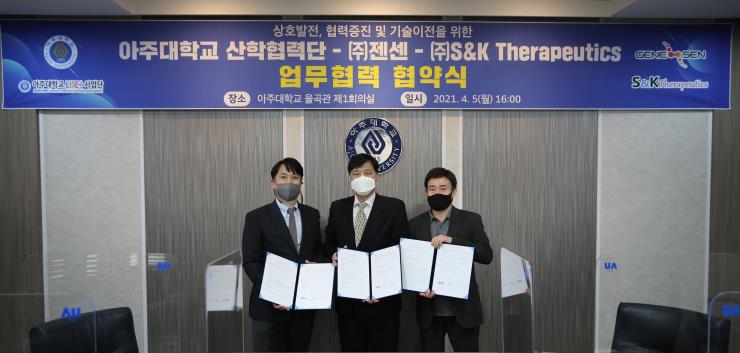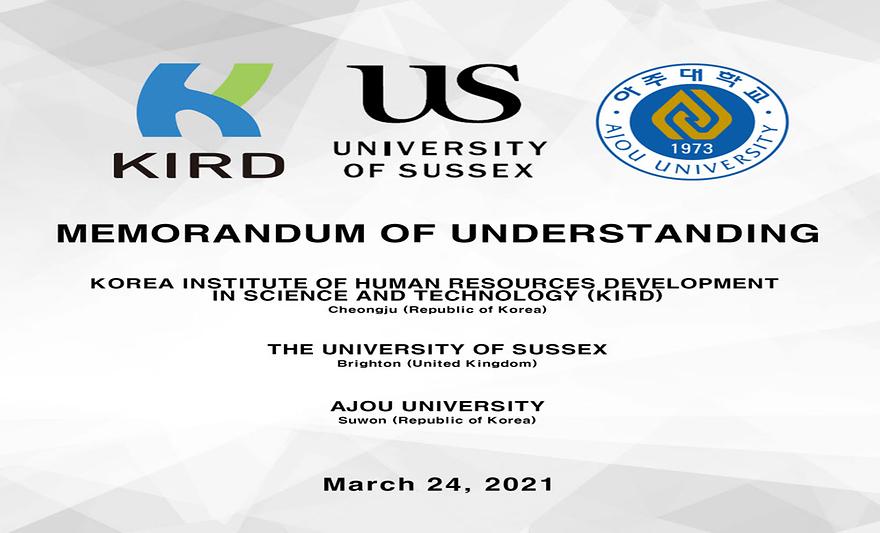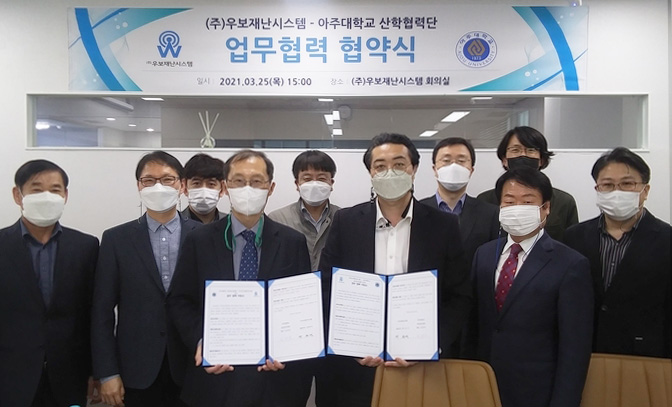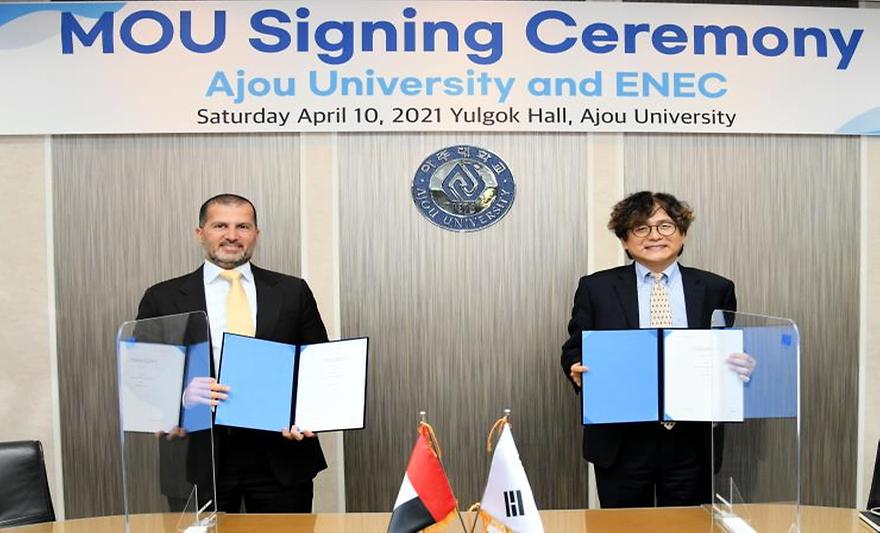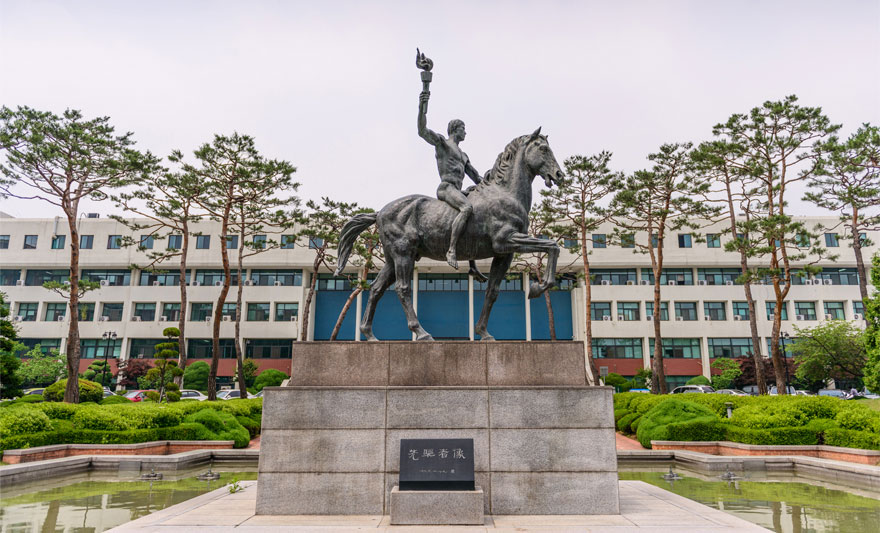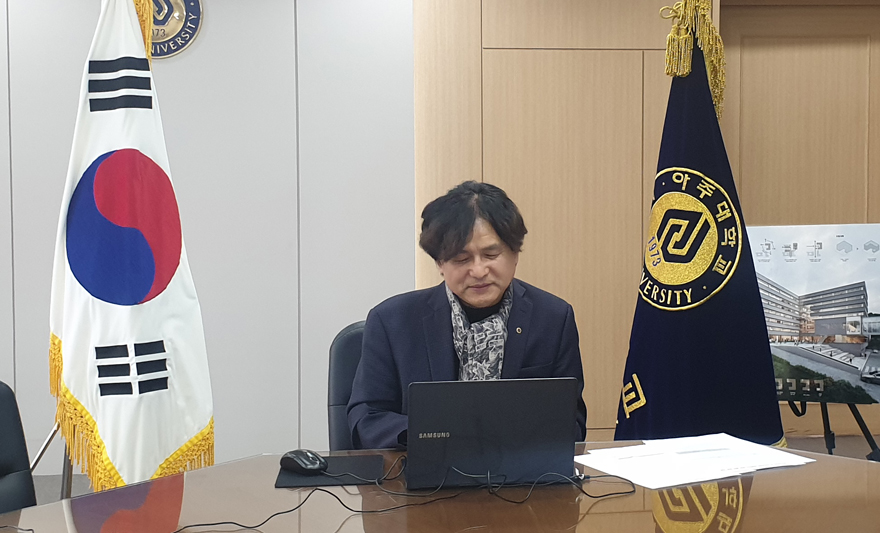-
Ajou University and Panoptics, a provider specialized in optics, have succeeded in developing multifunctional electronic tattoos using silk protein nanofibers. The invention is expected to be a next-generation healthcare device, enabling diagnosis and drug injection after attachment to uneven skin tissues after drawing the needed circuits on the skin. Prof. Kim Sung-hwan, Departments of Physics and Energy Systems Research (pictured left), announced successful development of electronic tattoos, making it possible to draw circuits on silk protein nanofibers with carbon nanofiber ink.The achievement was entitled, “Multifunctional and Ultrathin Electronic Tattoo for On-Skin Diagnostic and Therapeutic Applications,” and appeared on the Frontispiece page of the online edition of Advanced Materials, a prestigious international journal focused on materials science, on May 6. The research was conducted in collaboration with Panoptics. Primarily authored by Prof. Narendar Gogurla, Research Assistant Professor (pictured right), it was also written together with Mr. Kim Jang-sun, CEO of Panoptics, and three other authors. There is a fast-growing body of research worldwide on materials for next-generation electronic healthcare devices, as such devices are capable of detecting and analyzing vital signs automatically. Electronic materials that can provide as much flexibility and elasticity as actual human skin are needed and countless researchers have dedicated themselves to developing materials and devices that combine flexible substrates with electrodes and electronics to read and analyze vital signs from the human body. These materials are known as “electronic skin” today. Finding the right interface between electronic skin and actual human skin that can attach flawlessly to uneven skin surfaces, such as finger pads, and have enhanced biocompatibility is vital. Ultrathin electronic circuits using biocompatible materials have been very challenging to develop. Prof. Kim’s team sought to resolve this problem with proteins—particularly silk proteins available from natural sources. Protein derived from silkworms is a skin-friendly and high-molecular biomaterial with superior physical and chemical properties. In the first step, the researchers make silk nanofiber paper, with a thickness equivalent to one-fiftieth of a strand of human hair, using electrospinning. Afterwards, they draw circuits on the silk nanofiber paper using carbon nanofiber ink and brush. Once the ink dries, the drawn circuits come out. If the circuits are placed on slightly moist skin, this creates the electronic tattoos.These electronic tattoos are ultrathin and can be put on finely-wrinkled skin surfaces like finger pads while maintaining stability in their electric properties during our everyday activities, besides taking showers. Electronic tattoos are simple to wipe off with wet wipes. Materials derived from carbon nanofibers are harmless as the silk nanofibers are injected into the middle of the electronic tattoos.Electronic tattoos, as they are attached to the skin, can be used as electrodes for electrocardiography or electromyography. They can also be used in thermal therapy or drug injections. Weak electric currents transmitted to the electronic tattoos or exposing the tattoos to sunlight creates a certain level of heat through carbon nanofibers. The fact that light can be used to create heat means that electronic tattoos can be heated remotely, implying a broad and diverse scope of application. Together with the ability to inject drugs into silk proteins, controlling the temperature of the tattoos remotely will increase the efficiency of drug injections. Prof. Kim explained: “Although there has been significant progress in research on harvesting energy from the human body, the problems related to human-machine interfacing have been relatively neglected. Using proteins, of which natural skin is composed, interfaces capable of bridging the material difference between the human body and electronic devices can be developed.”He also added: “Our project is significant in that our invention can help increase the application of biomaterials to a variety of electronic devices. We hope to see our product applied to a wide range of healthcare products and soft robotics in the future.”Sponsored by the National Research Foundation of Korea, the BK21 FOUR, the Gyeonggi-do Regional Research Center (GRRC), and the Korea Institute of Energy Technology Evaluation and Planning, the electronic tattoo technology was developed in partnership with Panoptics. Patent applications in Korea and technology transfer have been approved as well.A conceptual image of silk protein-based electronic tattoos Circuits drawn with carbon nanofiber ink on silkworm-derived silk paper can be attached to the skin like a tattoo.
-
505
- 작성자OIA
- 작성일2021-07-01
- 5327
- 동영상동영상
-
Ajou University was ranked in the 200s in the World University Rankings 2021 by Times Higher Education (THE). It is sixth among domestic universities that took part in the assessment.THE announced Impact Rankings 2021 for 1115 universities in 94 countries worldwide. Marking its third year this year, the assessment focuses on how well universities are fulfilling their social responsibilities.More specifically, it assesses efforts universities are making to achieve the United Nations Sustainable Development Goals (SDGs). In 2015, the UN identified 17 SDGs as a blueprint for humanity in five areas—people, earth, prosperity, peace and partnership—to achieve the ideas of sustainable development. Ajou University ranked in the 201 – 300 range in THE Impact Rankings 2021. This is a significant improvement over last year’s ranking, which put it in the 401-600 range. It is worth noting that it ranked 95th for the industry and innovative infrastructure sector (SDG9), managing to enter the global Top 100. The School’s close engagement with industry in the field of education and research has contributed to creation of a broad ecosystem for cooperation between industry and academia, which was the reason behind the recognition.The School also ranked in the 101-200 range in No Poverty (SDG1), Good Health and Well-being (SDG3), Quality Education (SDG4), Reducing Inequality (SDG10), and Sustainable Cities and Communities (SDG11). Notably, it ranked 2nd among domestic universities in the Good Health and Well-being (SDG3) sector. Ajou University’s multi-faceted education and social contribution programs for local communities utilizing the expertise of its members and efforts such as its Blue Ladder Program, a global training program for university students lacking opportunities to gain international experience due to social and economic difficulties, have led to its high performance in this field.In 2019, Ajou University established “Ajou Vision 4.0”, its mid- and long-term plan which enshrines the vision “Change the World with Connecting Minds.” As part of its action plan, the Ajou Sustainable Development Center was founded in 2020, to shape projects towards sustainable development and conduct research and campaigns to spread this culture within the campus.In THE Impact Rankings 2021, many universities in the UK and Australia that have been committed to achieving human well-being and protection of the global environment were among the highest-ranking schools. The University of Manchester (UK) ranked first place, followed by the University of Sydney, RMIT University, and La Trobe University (Australia). Among domestic universities, Yonsei University (30th) and Kyungpook National University (54th) managed to rank among the Top 100.
-
503
- 작성자OIA
- 작성일2021-05-24
- 5208
- 동영상동영상
-
Ajou University concluded an agreement with the Gyeonggi Provincial Office to cooperate in the field of autonomous driving. The agreement was made between Ajou University, Pohang University of Science and Technology (POSTECH), Kyung Hee University, Sungkyunkwan University, and the Advanced Institute of Convenience Technology (AICT).A signing ceremony was held at the Gyeonggi-do Office on April 30, 2021 and attended by Gyeonggi-do Governor Lee Jae-myung, Ajou University President Park Hyung-ju, POSTECH President Kim Moo-hwan, Kyung Hee University President Hahn Kyun-tae, Sungkyunkwan University President Shin Dong-ryeol, and AICT President Joo Young-chang. Director of Ajou University’s Autonomous Driving Mobility Center Song Bong-seob, who is also Professor of Mechanical Engineering at Ajou University, was also present.The Gyeonggi Provincial Office will provide big data produced in its Autonomous Driving Center to universities that are parties to the agreement. More specifically, it will provide autonomous driving testbeds, big data, and facilities for research in autonomous driving, including PCs and software, and build a Gyeonggi-University Big Data System to share research outcomes.Universities will run courses utilizing autonomous driving big data, and in collaboration with Gyeonggi Provincial Office, host a contest in autonomous driving big data and AI. They are also planning to set up special courses in big data and courses utilizing autonomous driving big data for executives and employees of Pangyo 2nd Techno Valley.At the ceremony, Ajou University President Park commented, “This agreement is particularly significant as the autonomous driving public data to be provided by the Gyeonggi-do Provincial Office includes not only vehicle-related data but also control data.” He continued, “We hope the trilateral cooperation between the Gyeonggi-do Provincial Office, universities, and AICT and the relocation of Gyeonggido Office to Gwanggyo will serve as an opportunity to realize the next generation of Zero Shuttle: Zero Shuttle 2.0.”He also added, “Ajou University is conducting research to connect transport, ITS (Intelligent Transport Systems), and autonomous driving by providing support to large-scale research groups and promoting collaboration among researchers,” and “The school will contribute significantly to joint research in the field of safety in autonomous driving.”The Gyeonggido Provincial Office founded the Gyeonggi Autonomous Driving Center with AICT in 2019 to construct an ecosystem for autonomous driving. The Center continues to support demonstrations by autonomous-related companies and research institutes. It incubates new autonomous driving businesses through its Business Center and runs an autonomous driving shuttle known as “Zero Shuttle.”
-
501
- 작성자OIA
- 작성일2021-05-24
- 4910
- 동영상동영상
-
Ajou University was designated for participation in the Ministry of Science and ICT’s Korea Initiative for Fostering University of Research & Innovation (KIURI) Project.The KIURI Project was initiated in 2020 to make researchers with PhDs in science and engineering independent and promote their entry into industry.The three-year project will run from May 2021 to October 2024 with a grant of KRW 1.5 billion per year. Post-doc researchers taking part in the project will receive research grants of around KRW 100 million per year, including labor costs, for up to three years.Accordingly, the school established the AI-Super Convergence KIURI Translational Research Group to Combat Disease (led by Kim Byung-gon, Professor of Brain Science and Neurology) to produce the human resources needed in basic biomedical science, translational research between clinical medicine fields, development of AI-based new drugs, and new bio materials to manage bodily functions.It will also build a cooperative network with 21 bio firms located in Southern Gyeonggi Province, including Huons, OliPass, Plarit, and Frombio, to develop technology needed by corporations and provide advice and dispatch researchers to offer practical support to companies seeking to increase their development capacities.The school will recruit 12 post-doc researchers in different majors from colleges of medicine, engineering, pharmacy, and natural sciences by the end of August 2021. It will develop programs for the newly recruited researchers and match them with faculty mentors and participating businesses in related fields to engage in industry-academia convergence research.Four university research groups have been assigned to the KIURI Project, including Seoul National University (bio-health), Sungkyunkwan University (energy and environment), Yonsei University (future car materials and parts), and Pohang University of Science and Technology (diagnostics and therapeutics), and 68 post-doc researchers have been carrying out research since 2020. This year, Ajou University and Inha University were designated, with each adding 12 new researchers. A total of 92 post-doc researchers will develop into leading personnel in industrial innovation.Ajou UniversityResearch group focused on new post-doc research personnelPartners:Middle market businesses/SMEs and bio ventures located in southern Gyeonggi ProvinceRegulations on support system and promotions:Guarantees stable position for new researchersAI-super convergence KIURI Translational Research Group to Combat DiseaseCreate startup ecosystemBuild industry-academia cooperation platform: Ajou Translational Research Center (ATRC)School of Medicine Address lack of human resourcesSupport strengthening of independent research capacity: Support capacity for industrial innovation in creative cutting-edge researchCollege of PharmacyDevelop competitiveness in bio technologyBuild infrastructure to enhance academic excellence: Support information and technology for academic research and educationCollege of Engineering, College of Natural SciencesAcquire competitiveness in Industry 4.0Artificial Intelligence (AI)Bio- and Pharma-hubs in southern Gyeonggi Province
-
499
- 작성자OIA
- 작성일2021-05-24
- 5620
- 동영상동영상
-
Ajou University was chosen to participate in the R&D Project to Nurture Human Resources in Regulatory Science, sponsored by the Ministry of Food and Drug Safety (MFDS), and will receive a subsidy of KRW 2.5 billion in total over the next five years.Regulatory science involves the development of new tools, criteria, and approaches to evaluate safety, validity, quality, and performance, among others, of food, drugs, medical devices and other regulated products. Recent growth in the bio-health industry has triggered a notable increase in demand for human resources in this field.The R&D Project to Nurture Human Resources in Regulatory Science is a new government-funded initiative in 2021 by the MFDS and aims at developing researchers and field experts to lead new industries in regulatory science through trilateral cooperation among industry, academia, and research institutes.The selection of universities to carry out the project occurred through a contest in which the MFDS designated projects in the three fields of pharmaceuticals, medical devices, and food. Ajou University was chosen for ‘Evaluation of Pharmaceutical Product Safety’ (managed by the College of Pharmacy; Chief of Research Lee Suk-hyang, Dean of the College of Pharmacy). As a result, the College of Pharmacy will begin a graduate program in Bio-health and Regulatory Science and invite 20 new students beginning the second semester of the 2021 academic year.The curriculum for Bio-health and Regulatory Science majors will focus on on-site, practical education, which will include Advanced Theory on Regulatory Science, International Council for Harmonization of Technical Requirements for Pharmaceuticals for Human Use (ICH) Guidelines, Clinical Pharmacology, Evidence-based Regulatory Decision-making, Big Data (RWD/RWE) Analysis and internships at bio-pharma companies.Graduates will be able to move on to numerous entities, including pharmaceutical research institutes and bio-health safety evaluation companies, or work as regulatory science legal experts in relation to certification of contract research organizations (CROs) or healthcare data analysts.Throughout this project, Ajou University plans to cultivate more than 120 core persons to lead the global regulatory science industry. To achieve this goal, the major will begin in the second semester this year and the Department of Bio-health Regulatory Science in 2022.
-
497
- 작성자OIA
- 작성일2021-05-24
- 5066
- 동영상동영상
-
President of Ajou University Park Hyung-ju has been appointed chair of the Ministry of Education’s National Curriculum Reform Research Committee. An appointment ceremony was held at the Government Complex Sejong Convention Center in Sejong City on April 20, 2021 and a letter of appointment presented by Deputy Prime Minister and Minister of Education Yoo Eun-hae to President Park and other commissioners.The National Curriculum Reform Research Committee was set up to revise the curriculum for elementary, middle and high schools to respond to a changing education environment, including rapid social changes from acceleration of AI and Industry 4.0 and a decline in the number of students, and prepare for a transition to education more geared towards the future.The Committee is comprised of experts from different fields, including teachers and members of academia and related institutions, and representatives of civil society and will engage in research and development of curricula, discuss issues and operational matters regarding the curricula, and devise a revised curriculum.The Committee will gather opinions from forums, online discussions, hearings, and deliberative meetings as it builds the revised curricula, and acquiring social consent on the revisions, making a public announcement during the fall of 2022.
-
495
- 작성자OIA
- 작성일2021-05-24
- 4995
- 동영상동영상
-
Ajou University Industry-Academic Cooperation Foundation signed a memorandum of understanding (MOU) with new drug development ventures Genesen and S&K Therapeutics. The three institutions will be working closely together to commercialize treatment for autoimmune and inflammatory diseases.A signing ceremony was held at Yulgok Hall on April 5, 2021 and attended by Industry-Academic Cooperation Foundation Director and Head of LINC+ Project Group Professor Kwon Yong-jin, Genesen CEO Lee Sung-ho, and S&K Therapeutics CEO Choi Sang-dun, who is also a professor in the Departments of Biological Sciences and Molecular Science and Technology at Ajou University. Genesen is a venture developing new peptide drugs using molecular modeling. In 2018, it signed a technology transfer agreement, worth KRW 4 billion, for peptide-based autoimmune disease treatment candidate material developed by the research team led by Professor Choi.This latest agreement will enable Genesen to receive the technology of a follow-up peptide candidate material developed by the Ajou University research team and expand R&D pipelines. The follow-up technology transfer is valued at around KRW 1 billion.S&K Therapeutics, founded in 2020 by Professor Choi, who led the R&D on this technology, was also party to the agreement. It specializes in the development of small molecule therapies for inflammatory diseases.With the agreement, Ajou University Industry-Academic Cooperation Foundation will support the commercialization of peptide drugs for autoimmune disease with Genesen and engage in strategic cooperation with S&K Therapeutics for commercialization of chemical compound therapy for inflammatory diseases. The two companies agreed to cooperate towards mutual development going forward.
-
493
- 작성자OIA
- 작성일2021-05-24
- 5826
- 동영상동영상
-
Ajou University’s New Industry Convergence Technology R&D Center signed a trilateral agreement with the Korea Institute of Human Resources Development in Science and Technology (KIRD) and the University of Sussex Science Policy Research Unit (SPRU).The signing ceremony was conducted in a contactless environment. The agreement will enable the three institutions to work together in many fields of research and education, including construction of a science and technology policy network, development of human resources in science and technology in Korea, and sharing of Europe’s policy model in developing talent in science and technology.To this end, the three parties will conduct joint research on science and technology policy, jointly plan and operate education programs, cooperate in exchange student and training programs, exchange personnel in science and technology policy and arrange visits, and share information on education and research in science and technology policy.Founded in 2015, the New Industry Convergence Technology R&D Center works with businesses and the government in carrying out joint industry-academia research projects and cultivation of future human resources for the promotion of research in new industry convergence technology, such as smart grids, smart factories, and smart fintech.Center Director Lee Joo-yeon stated, “We hope the global cooperation in education and research on science and technology policy will cultivate world-leading professionals in this field and promote practical research.”
-
491
- 작성자OIA
- 작성일2021-05-24
- 3416
- 동영상동영상
-
Ajou University’s MR-IoT Convergence Disaster Response AI Research Center (hereafter, “MR-IoT Research Center”) signed a memorandum of understanding (MOU) with Woobo Systems to conduct research in disaster response AI.The signing ceremony was held at Woobo Systems on April 25, 2021 and attended by MR-IoT Research Center Director Roh Byeong-hee (Professor of Software at Ajou University) and Woobo Systems CEO Chang Hee-seok, along with staff from both institutions.The agreement enables the parties to build a cooperative system in research for the development of mixed reality (MR) and Internet-of-Things (IoT) convergence technology, develop public research projects, such as in the field of disaster response, utilizing Industry 4.0 technologies (AR, VR, IoT, and AI, etc.), and to cooperate in other matters of common interest.Woobo Systems specializes in the development and manufacture of integrated disaster prevention systems against natural and social disasters—climate equipment and systems for observation, disaster forecasting, and warning.“MR-IoT convergence AI technology supports decision-making and is considered one of the most important fields in future industries,” says Director Roh. “We will devote our efforts to leading AI technology and cultivating experts in this field.”CEO Chang commented, “We have constantly been working on the application of IoT and AI technologies by taking part in disaster safety projects with the central and local governments and developing disaster prevention systems. […] With this opportunity to work together with academia, we will engage in technology R&D that will involve converging MR technology with disaster response.”Ajou University was appointed to take part in the “University ICT Research Center Project” sponsored by the Ministry of Science and ICT in 2018 and established the MR-IoT Convergence Disaster Response AI Research Center. The Center shares technology and information on disasters and safety with various institutions in Korea and abroad through cooperation and MOUs and develops and researches MR and IoT convergence equipment.
-
489
- 작성자OIA
- 작성일2021-05-24
- 3531
- 동영상동영상
-
Abu Dhabi, United Arab Emirates, 10 April 2021: The Emirates Nuclear Energy Corporation (ENEC) has signed a Memorandum of Understanding (MoU) with Ajou University, a leading research institution based in Gyeonggi-do, South Korea. The MoU will provide a framework for collaboration for research & development (R&D) and innovation in the energy fields. The MoU was signed by His Excellency Mohamed Ibrahim AL Hammadi the Chief Executive Officer of ENEC and Dr. Hyungju Park President of Ajou University.The MOU reinforces the continuous collaboration between the UAE & the Republic of Korea in the R&D fields, building on the strong relationship between the two nations and opening the door for new opportunities across various sectors in the energy industry for both countries.With signing the memorandum of understanding, Ajou University and the Emirates Nuclear Power Corporation(ENEC) will collaborate to develop research in the energy industry, including nuclear power, and also to cultivate human resources.They also agreed to expand cooperation fields by starting joint research in industrial mathematics. ENEC is responsible for developing the UAE Peaceful Nuclear Energy Program and its flagship Barakah Nuclear Energy Plant, one of the largest nuclear plants globally. Established in 2009, ENEC is delivering safe, clean, efficient and reliable electricity through nuclear energy to support the UAE’s sustainable social and economic growth.ENEC recently celebrated its most historic milestone to date with the start of commercial operations of Unit 1 of the Barakah Nuclear Energy Plant. The Unit produces 1,400 MW of emissions-free electricity 24/7 to power homes and business across the UAE, driving the largest decarbonization effort in the country and helping to tackle climate change.
-
487
- 작성자OIA
- 작성일2021-04-19
- 5084
- 동영상동영상
-
Ajou University signed a memorandum of understanding (MOU) with the city of Suwon to cooperate over fostering the local new and renewable energy industry. The MOU signing ceremony took place online on February 5, attended by University President Park Hyung-ju and Suwon’s Mayor Yeom Tae-young. The memorandum led both parties to affirm their commitment to close cooperation on fostering new and renewable energy businesses and a culture of energy diversification.Under the new agreement, the two parties intend to co-organize programs towards developing the new and renewable energy industry and facilitating energy transition, and also to work together on running a regional energy center. The two parties also discussed possible cooperation over the joint research and development of new energy technologies.Specifically, the two parties agreed to assemble a board of advisors on new and renewable energy (especially hydrogen), connect Suwon’s regional energy center with Ajou’s, increase support for use of new and renewable energy by local government agencies, businesses, and research institutes, launch campaigns to usher in a shift in energy paradigm, and support Ajou’s BK21 projects.Ajou, for its part, will prioritize providing energy-related education and advice and accelerating academic, research, and technical activities.Since identifying the core areas of industry-university cooperation it is particularly suited to specialize in, Ajou University has opened industrial cooperation centers (ICCs) to develop local businesses in these areas. There are currently four ICCs, dedicated to smart mobility, biotechnology and healthcare, new and renewable energy, and AI and big data.
-
485
- 작성자OIA
- 작성일2021-03-19
- 7768
- 동영상동영상
-
-
483
- 작성자OIA
- 작성일2021-03-19
- 7798
- 동영상동영상

